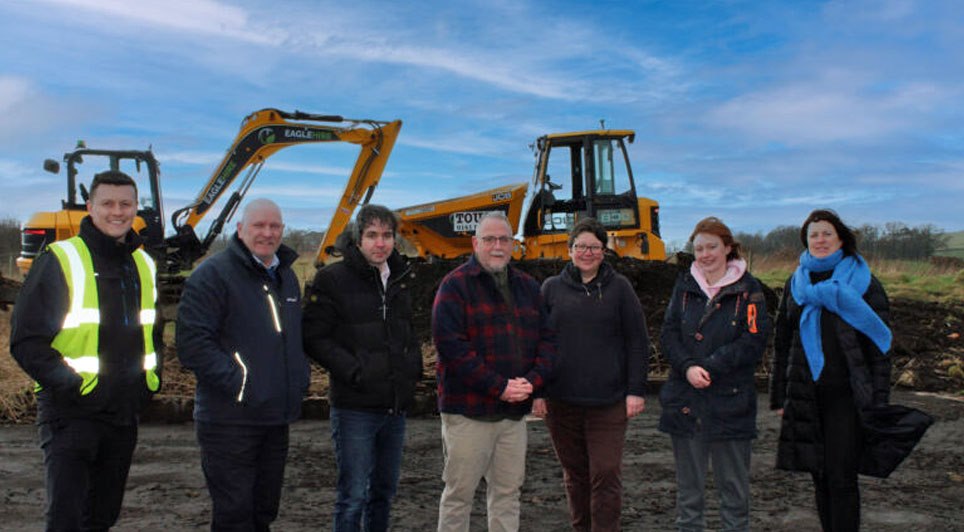The Scottish construction industry will continue to contract in 2012 but is expected to return to growth in 2013, according to the latest figures published today from the Construction Skills Network (CSN).
The annual report from CITB-ConstructionSkills, the Sector Skills Council and Industry Training Board for the industry shows construction employment in Scotland is set to grow at an annual average rate of 1.1% between 2012 and 2016, almost twice the rate of the UK as a whole (0.6%). Scotland is one of only three areas in the UK where employment is expected to be higher in 2016 than its previous peak.
The report confirms that the Scottish construction industry as a whole suffered a tough year in 2011 and shows that the recovery seen in 2010 was short-lived – there was an estimated decline of 3% in output last year in real terms. The weakening economic conditions in the second half of 2011, due to the well-publicised debt problems among Eurozone countries, has meant that activity has been depressed in the private sector as in the public sectors.
Next year looks set to be another difficult year for the industry in Scotland with output predicted to decline by -5%. Prospects for the private housing, industrial and commercial sectors remain muted in the short-term and anticipated public expenditure cuts will hit the public housing and public non-housing sectors hard.
Strongest growth in Scotland is anticipated in the infrastructure sector with an annual average rate of increase of 4.7%. The Scottish Government’s capital budgets for road, rail and water are planned to reach nearly £939m in 2014/15 and there is a raft of transport projects to be taken forward, including the Forth Road Crossing and dualling of the A9 between Perth and Inverness.
Graeme Ogilvy, Director for ConstructionSkills in Scotland said: "This year’s CSN report points towards some positive long-term growth trends compared to the rest of the UK, but it remains clear that conditions will remain challenging in the short-term, which will not be welcome news for firms and workers. In these challenging conditions where youth unemployment is a particular problem, it is vital for firms to maintain a competitive edge and to continue to invest in training and apprenticeships so that they ensure they are prepared for the projected return to growth next year.
"I am pleased that the Scottish Government has committed the public sector to provide training and apprenticeship plans in public contracts. However, in order to boost employment prospects beyond 2012, it’s imperative that planned infrastructure projects start as soon as possible.
"Overall the long term picture looks promising and the construction sector has the potential to create an economic stimulus to help return the Scottish economy to growth."
Alex Neil, Cabinet Secretary for Infrastructure and Capital Investment, said: "This is a valuable report that makes clear that the Construction industry continues to face considerable challenges. Crucially it also shows the substantial difference we are making in Scotland by reversing Westminster cuts over the course of this spending review, and increasing our total capital spending. With construction employment in Scotland projected to grow at nearly twice the UK average, there can be no doubt that is the right decision for jobs and the right decision for our economy.
"But with short term prospects remaining tough, we should also be under no illusion that the UK Government has fallen far short of providing the actions in their gift to support our economy and our construction industry. That is a powerful illustration that Scotland could do substantially better with full economic powers at its disposal, and urgently needs substantial borrowing powers at the very least."
In further welcome news for the sector’s employment prospects, the recent National Infrastructure Plan will make it a requirement for firms in receipt of public contracts to develop a training and apprentice plan. The CSN report also points to Scottish Government policies which could have a positive future impact, including the development of innovative methods to fund capital expenditure projects and the transition to a low carbon economy that offers potential opportunities for the construction industry.
At a UK national level the outlook for the construction industry over the next five years will remain extremely challenging – with growth expected to be slow and uneven. The early part of the forecast period is predicted to be particularly bleak with a 3% fall in output during 2012 and little sign of growth until 2013 when output is expected to bounce back by 4%. Over the medium-term growth is then set to fall back slightly before settling into a period of slow and steady growth, albeit below previous long-term trends. In Scotland, growth over the period of 2012-2016 is expected at an annual average rate of 1.3%, which is in line with the UK average.
(GK)
Construction News
25/01/2012
Scottish Construction Set To Decline Further

30/04/2025
Plans for a £43 million education campus on the Isle of Mull have moved forward, Argyll and Bute Council has confirmed.
Following a decision earlier this month on the preferred location, the council will now progress with developing a detailed brief and concept design to inform the overall busines

30/04/2025
Global engineering and development consultancy Mott MacDonald has been appointed by Strathclyde Partnership for Transport (SPT), in collaboration with Glasgow City Council on behalf of the Glasgow City Region, to progress two key elements of the Case for Investment for the ambitious Clyde Metro proj

30/04/2025
Members of the Caithness Committee have unanimously agreed to adopt the Caithness Area Place Plan (APP).
The committee also committed to fully supporting and promoting the plan, ensuring it is considered within other relevant plans, strategies, developments, and funding opportunities impacting the

30/04/2025
Plans for a new business park at Oban Airport have advanced significantly with the announcement that Argyll and Bute Council has appointed hub North Scotland to oversee the project and Robertson Construction as the main contractor.
The Oban Airport project is a key component of the council's Tax In

30/04/2025
Contractors engaged in public sector projects across the UK will soon be subject to random and targeted spot checks on their payment practices.
This move by the UK government is designed to tackle the persistent issue of late payments throughout the construction supply chain.
According to advice

30/04/2025
Ten new affordable flats for social rent have been completed by The Highland Council in Carrbridge, addressing a significant demand for smaller properties in the area.
The development, named Struan Court after the former Struan Hotel which previously occupied the site, offers eight one-bedroom and

30/04/2025
The City of Edinburgh Council has held collaborative summit with key partner organisations to explore avenues for expanding the availability of accessible housing across the capital.
The Accessible Housing Summit, hosted by the council, brought together representatives from the third sector, housin

30/04/2025
A significant step forward has been taken in the development of a new £16 million flood prevention scheme designed to safeguard Bridge of Allan. Stirling Council has approved the procurement of a contract to design and construct the essential flood defences.
The planned infrastructure will offer pr

30/04/2025
A significant 64% of companies within Scotland's renewable energy supply chain are actively investing in skills, capabilities, and facilities to capitalise on the nation's burgeoning clean energy market over the next three to five years, a survey by Scottish Renewables has revealed.
The findings we

30/04/2025
A collaborative effort between McTaggart Construction and West Dunbartonshire Council is set to bring new affordable housing and a range of community benefits to the Willox Park area. The partnership will deliver a 17-unit, client design led, affordable housing development, procured through Scotland
 Scotland
Scotland UK
UK Ireland
Ireland London
London











